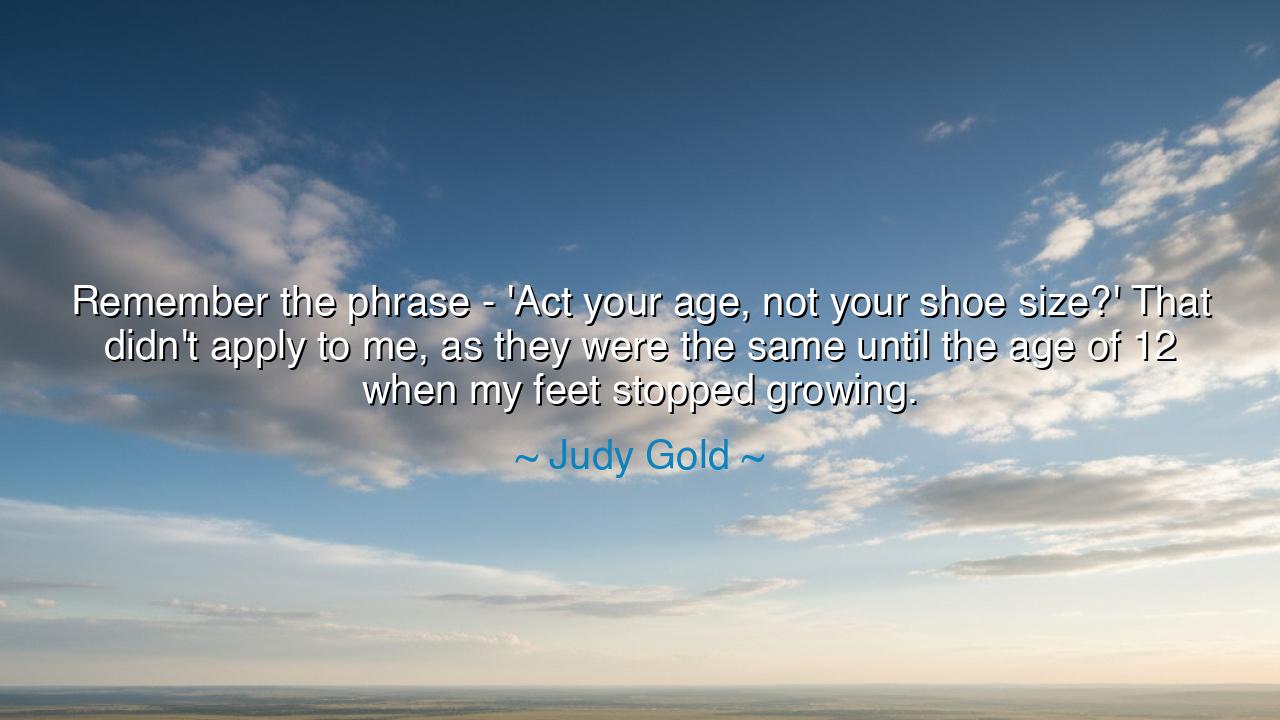
Remember the phrase - 'Act your age, not your shoe size?' That
Remember the phrase - 'Act your age, not your shoe size?' That didn't apply to me, as they were the same until the age of 12 when my feet stopped growing.






"Remember the phrase - 'Act your age, not your shoe size?' That didn't apply to me, as they were the same until the age of 12 when my feet stopped growing." These playful words by Judy Gold speak to a deeper truth about the relationship between identity, growth, and the societal expectations that often constrain us. The phrase “act your age” carries with it an unspoken rule about maturity and the way one should conduct themselves at different stages of life. Yet, Gold’s reflection invites us to question this assumption—that we must act according to a prescribed measure of age and maturity. Instead, she suggests that growth is not linear or confined to society’s expectations. Her feet may have stopped growing at twelve, but her spirit, her character, her humor, and her unique way of engaging with the world continued to expand, beyond any limits placed by age.
In the ancient world, such growth was celebrated not only in terms of physical development, but in terms of personal and spiritual evolution. Consider the Greek philosopher Diogenes, who famously lived in a barrel and rejected the norms of society, choosing instead to live authentically. Diogenes was not concerned with how society expected him to act based on his age, wealth, or status. He chose to live according to his own principles, much as Gold suggests in her quote. The message is that growth, and by extension, maturity, should not be limited by the shoes we are told to wear or the roles we are asked to play. Like Diogenes, Gold refuses to be boxed in by the conventional expectations of what one should or shouldn’t do at a certain age. She embraces a more fluid approach to maturity, one where the growth of the soul and the mind should never be constrained.
Gold’s words also challenge the societal idea that maturity equates to seriousness. The ancients often placed great value on wisdom, but they also acknowledged the importance of maintaining a childlike wonder. The great Aristotle, in his writings, discussed the balance between reason and imagination. While reason, he said, is the mark of a mature person, imagination and creativity remain essential at every age. Gold’s quote reflects this notion: just because one grows older, it doesn’t mean one should discard the joy and freedom associated with youth. To grow old without losing the lightheartedness and curiosity of a child is to live fully, embracing all the seasons of life without limiting oneself to the roles assigned by society.
We see echoes of this wisdom in the life of Leonardo da Vinci, whose curiosity and imagination remained boundless, even as he aged. Leonardo’s ability to remain curious and open to new learning throughout his life was a cornerstone of his genius. He did not fit neatly into the molds that society may have tried to impose on him. Whether he was painting, inventing, or studying anatomy, da Vinci was always exploring beyond his years, his mind forever young despite the passage of time. Much like Judy Gold’s refusal to act “according to her shoe size,” da Vinci remained unfettered by the idea that age should limit one’s ability to wonder, create, or explore.
Gold’s humor in the face of these societal expectations speaks to a broader, more profound truth—that the way we live our lives and define our maturity should not be about conforming to external rules. Rather, it should be about embracing our unique growth. The notion that one’s age should dictate how one behaves or what one enjoys is a narrow and restrictive view of the potential of human life. Age, in the truest sense, is not a limiting factor in growth, but merely a number—a way to measure the years passed. The real journey of growth is measured in the experiences we accumulate, the wisdom we choose to gather, and the ways in which we retain our curiosity, our laughter, and our capacity to love.
The lesson here is one of self-definition—of choosing, much like Gold did, to define maturity on our own terms. It is a reminder that growth is never bound by age or the way society prescribes us to live. Instead, it is about remaining true to the childlike wonder within, even as we move through the stages of life. Just as Gold refuses to conform to an age-old saying, she urges us to embrace our own unique journey of growth, a journey not defined by how others see us, but by how we choose to see ourselves.
In practical terms, this means we should question the norms and expectations placed on us—whether it is about how we should dress, how we should speak, or how we should behave at different stages of life. Let us not allow society’s measures of maturity to define us. Instead, let us cultivate and nurture our inner child, that part of us that is always curious, always playful, and always ready to grow. Age may change the physical body, but it should never hinder the growth of the spirit, the imagination, or the heart. Let us, then, live each day as an opportunity to keep growing—in mind, body, and soul—choosing to ride through life with vigor and joy, as though the road ahead is always full of new possibilities.






AAdministratorAdministrator
Welcome, honored guests. Please leave a comment, we will respond soon